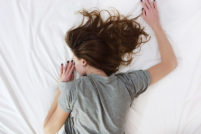Whether you have difficulty falling asleep, or find yourself waking up frequently during the night, practicing proper sleep hygiene can help you rest easier and get the sleep you need.
What Is Sleep Hygiene?
Sleep hygiene is an umbrella term used to describe specific lifestyle choices and habits which improve sleep.
Practicing sleep hygiene involves making behavioral and environmental changes which promote sleep, and avoiding those which interfere with it. [1]
The principles of sleep hygiene apply to all age groups: From newborns to seniors, we are all susceptible to sleep disturbances caused by lifestyle and environmental factors.
Why Should I Practice Sleep Hygiene?
Getting enough, and the right quality of sleep is integral for our physical, mental and emotional health. [2] Your body relies on sleep for:
- Proper Immune Function
- Hormonal Regulation
- Memory and Learning
- Emotional Stability
It’s thus easy to see that improving your sleep through sleep hygiene can ameliorate all aspects of your life: from productivity at work to the success of your interpersonal relationships.
Symptoms of a Sub-Optimal Sleep Hygiene

Is poor sleep hygiene affecting your sleep? If you are experiencing the symptoms listed below it’s recommended that you take a look at your daily routine and see what changes you can enact to improve your sleep:
- Taking a long time to fall asleep at night
- Frequent nighttime awakenings
- Not feeling tired at night
- Lower daytime energy and alertness
- Daytime fatigue
- Mood swings
Sleep is important for every system in our body to function correctly. By chronically getting an insufficient amount of sleep you increase your risk for developing chronic health conditions, such as:
- Obesity
- Diabetes
- Heart Disease
- Heart Attack
- Stroke
- Cognitive Impairment
- Depression
- Mood Disorders
- Anxiety
- Chronic Stress
How Does Sleep Hygiene Work?
Sleep hygiene works to improve sleep by having you follow a daily routine that is in tune with your biological clock and circadian rhythms.
Your body is an interconnected system, and everything you do and when you do it has a ripple effect which can have a negative or positive impact on a variety of biological processes.
By providing your body clock with the correct cues at the optimal times of day you are re-calibrating your system so that everything is in sync: Improving both efficiency and effectiveness.
How Can I Improve My Sleep Hygiene?
There are many simple steps you can take starting today to improve your sleep hygiene. These changes can be divided into two categories: Behavioral and environmental.
Behavioral

Exercise
Exercising daily is an important part of any healthy lifestyle; however, what type of exercise you do and the time you do it affects your ability to fall asleep at night.
Do Aerobic Exercise
Aerobic exercises such as walking, swimming and biking have been shown to be effective in treating insomnia. [3]
Exercise Daily
Experts recommend a daily exercise routine of 15-45 minutes. However, studies have shown that 150 minutes of exercise per week can improve sleep quality up to 80%. [4]
Exercise 3-5 Hours Before Bed
Leaving a 3-5 hour gap between your workout and bedtime allows you to fully benefit from the sleep-promoting drop in body temperature. [5]
Diet

What you eat, and when you eat are both important things to keep in mind when planning your daily meals. Eating too late in the day, or eating the wrong foods in the evening can be a recipe for a sleepless night.
- Avoid foods that inhibit sleep.
- Eat foods that contain tryptophan, melatonin, B vitamins and other sleep inducing components.
- Do not eat too close to bedtime.
- Eat smaller meals in the evening.
- Reduce your fluid intake in the evening.
Routine

You should establish a bedtime routine to help you wind down from the day, relax and prepare your body and mind for sleep.
By making sure you get to bed the same time every night, and following your preferred bedtime rituals you will fall asleep faster and sleep more soundly.
- Stick to a regular sleep-wake schedule.
- Choose a bedtime that enables you to get at least 7 hours of sleep.
- Establish relaxing bedtime rituals, such as taking a bath or meditating.
- Reserve your bed for sleep and sex.
Environmental

Your environment sends a variety of signals to your brain which have a significant impact on your sleep:
Light
Light is the strongest cue your body clock uses to guide your circadian rhythms (the natural day/night cycle.) In turn, light stimulations affects the release of the hormone melatonin which is integral to feeling sleepy at night.
Ensuring you get light stimulation during the correct times of day, and reducing or eliminating this stimulation at other times is one of the most effective ways to improve sleep.
- Get adequate exposure to natural light during the day.
- Dim the lights in the evening.
- Avoid the use of electronic devices (such as smartphones, laptops and TVs) in the evening.
Noise
A noisy nighttime environment is one of the surest ways to disrupt sleep. Try to eliminate as much noise as possible; and for those noises which can’t be avoided use a white-noise machine to reduce their impact on your sleep.
- Reduce noise as much as possible.
- Avoid listening to TV or radio while falling asleep.
- Use a white noise machine to reduce the impact of sudden noise disruptions.
Mattress & Bedding
When it comes to your bed, comfort is key; however, you also need to ensure your body is properly supported to prevent being woken up by aches and pains.
- Choose a mattress which is suitable for your sleep position.
- Upsize your mattress to a queen.
- Replace your mattress and pillows if they’re worn out.
- Choose natural, breathable fibers for your bedding.
- Change your bedding with the season.
Temperature
Body temperature plays a key role in our circadian rhythms and sleep-wake cycle. Ensuring your body is able to reach its desired temperature will result in a higher quality of sleep.
- Set your thermostat to 65-70 F (18-21 C).
- Wear socks or bring a hot water bottle to bed.
- Dress in comfortable, breathable fabrics that don’t trap heat.
Colors
The colors that surround us have the power to induce feelings of calm, relaxation; or alternatively energize you, and increase alertness.
Using the principles of color psychology when decorating your bedroom can help create the ideal environment for sleep.
- Do not use primary colors.
- Opt for a matte finish over a glossy one.
- Avoid purples, reds, grays, browns and golds.
- Use blue, green, yellow, silver and orange shades.
Practicing good sleep hygiene will not only help you sleep better, but will improve your overall health, fitness and general well-being.





